第八讲 情态动词
- 格式:doc
- 大小:71.64 KB
- 文档页数:9
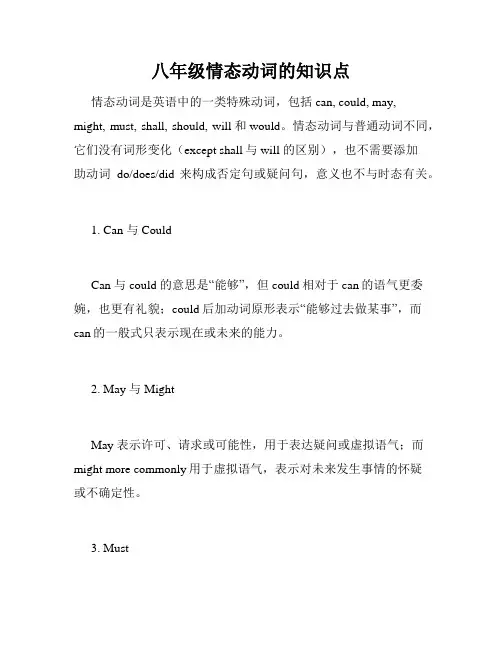
八年级情态动词的知识点情态动词是英语中的一类特殊动词,包括can, could, may, might, must, shall, should, will和would。
情态动词与普通动词不同,它们没有词形变化(except shall与will 的区别),也不需要添加助动词do/does/did来构成否定句或疑问句,意义也不与时态有关。
1. Can 与 CouldCan 与could 的意思是“能够”,但could相对于can的语气更委婉,也更有礼貌;could后加动词原形表示“能够过去做某事”,而can的一般式只表示现在或未来的能力。
2. May 与 MightMay 表示许可、请求或可能性,用于表达疑问或虚拟语气;而might more commonly用于虚拟语气,表示对未来发生事情的怀疑或不确定性。
3. MustMust强调必须、不可避免,表示绝对肯定或高度推断;用于表达命令或建议,以及对情况的强烈表示。
4. Shall 与 ShouldShall 和should用于表达命令、请求或建议,但shall主要用于将来时,而should则是一种情态动词,强调道义义务和道义要求,较具有礼貌和客观性。
5. Will 与 WouldWill 表示将要发生的事情,也表示愿望或决心;Would则常用于虚拟语气和条件句,表示假设、愿望或敬语。
6. Can与May的用法差异Can 表示某人能够做某事,能力在第一位。
而may则强调许可、允许的意义,是语气委婉的表达方式。
7. Should与Would的用法差异Should是一种道义上的情态动词,引申出一定的礼貌和可能性;而would则更多地表示愿望和推测,即假设的语气。
8. Must 和Have to两者不同点:must是限定词,have to 则比较口语化,常用于口语中;must表示主观推断,而have to则表示客观事实。
9. 动词原型与情态动词连用情态动词和动词原形连用是比较常见的用法。
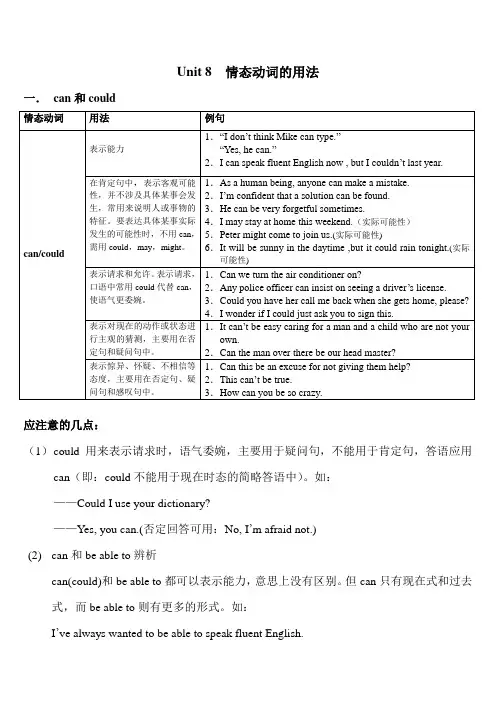
Unit 8 情态动词的用法一.can和could应注意的几点:(1)c ould用来表示请求时,语气委婉,主要用于疑问句,不能用于肯定句,答语应用can(即:could不能用于现在时态的简略答语中)。
如:——Could I use your dictionary?——Yes, you can.(否定回答可用:No, I’m afraid not.)(2)can和be able to辨析can(could)和be able to都可以表示能力,意思上没有区别。
但can只有现在式和过去式,而be able to则有更多的形式。
如:I’ve always wanted to be able to speak fluent English.Those bags look really heavy, are you sure you’ll be able to carry them on your own?但是,表示在过去某时的某一场合经过一番努力,终于做成了某事,通常不用could,而用was/were able to来表示。
这时,was/were able to相当于managed to do或succeed in doing。
如:After the accident it was a long time before she was able to walk again.The fire was very big, but most people were able to escape from the building.(3) 惯用形式“cannot …too…”表示“无论怎么……也不(过分)”。
如:You cannot be too careful.你越小心越好。
惯用形式“cannot but+ 不定式(不带to)”表示“不得不,只好”。
如:I cannot but admire her determination.我不得不钦佩她的决心。
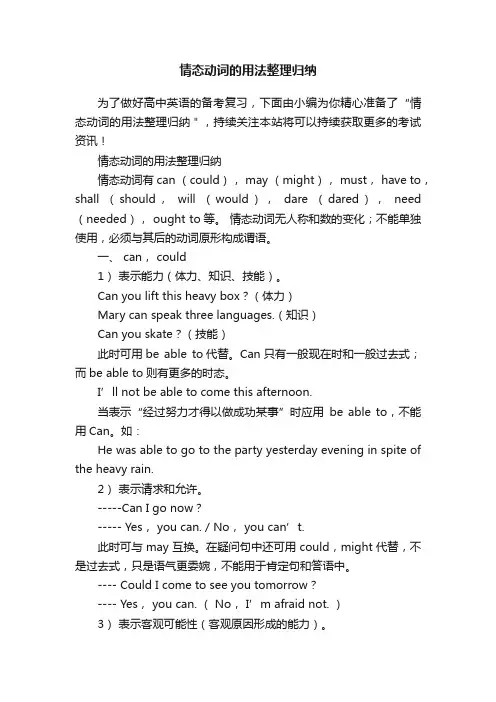
情态动词的用法整理归纳为了做好高中英语的备考复习,下面由小编为你精心准备了“情态动词的用法整理归纳",持续关注本站将可以持续获取更多的考试资讯!情态动词的用法整理归纳情态动词有can (could), may (might), must, have to,shall (should,will (would),dare (dared),need (needed), ought to等。
情态动词无人称和数的变化;不能单独使用,必须与其后的动词原形构成谓语。
一、 can, could1)表示能力(体力、知识、技能)。
Can you lift this heavy box?(体力)Mary can speak three languages.(知识)Can you skate?(技能)此时可用be able to代替。
Can只有一般现在时和一般过去式;而be able to则有更多的时态。
I’ll not be able to come this afternoon.当表示“经过努力才得以做成功某事”时应用be able to,不能用Can。
如:He was able to go to the party yesterday evening in spite of the heavy rain.2)表示请求和允许。
-----Can I go now?----- Yes, you can. / No,you can’t.此时可与may互换。
在疑问句中还可用could,might代替,不是过去式,只是语气更委婉,不能用于肯定句和答语中。
---- Could I come to see you tomorrow?---- Yes, you can. ( No,I’m afraid not. )3)表示客观可能性(客观原因形成的能力)。
They’ve changed the timetable,so we can go by bus instead.This hall can hold 500 people at least.4)表示推测(惊讶、怀疑、不相信的态度),用于疑问句、否定句和感叹句中。
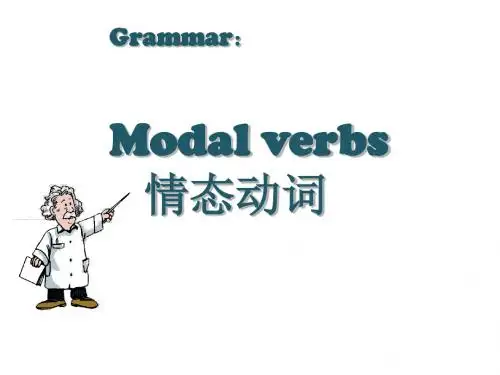
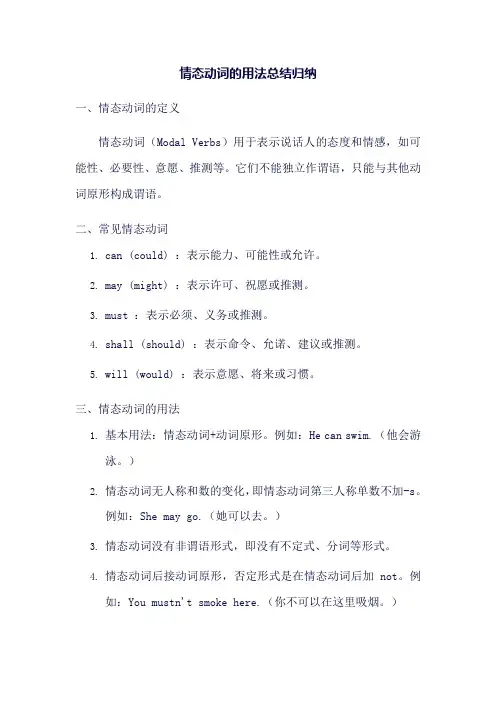
情态动词的用法总结归纳一、情态动词的定义情态动词(Modal Verbs)用于表示说话人的态度和情感,如可能性、必要性、意愿、推测等。
它们不能独立作谓语,只能与其他动词原形构成谓语。
二、常见情态动词1.can (could) :表示能力、可能性或允许。
2.may (might) :表示许可、祝愿或推测。
3.must :表示必须、义务或推测。
4.shall (should) :表示命令、允诺、建议或推测。
5.will (would) :表示意愿、将来或习惯。
三、情态动词的用法1.基本用法:情态动词+动词原形。
例如:He can swim.(他会游泳。
)2.情态动词无人称和数的变化,即情态动词第三人称单数不加-s。
例如:She may go.(她可以去。
)3.情态动词没有非谓语形式,即没有不定式、分词等形式。
4.情态动词后接动词原形,否定形式是在情态动词后加not。
例如:You mustn't smoke here.(你不可以在这里吸烟。
)5.带有情态动词的疑问句和否定句变换只需将情态动词提到主语前或直接在情态动词后加not。
例如:Can he dance?(他会跳舞吗?)He can't dance.(他不会跳舞。
)6.情态动词可以表示推测和可能性。
例如:It may rain tomorrow.(明天可能会下雨。
)7.情态动词可以表示命令和建议。
例如:You should study hard.(你应该努力学习。
)8.情态动词可以表示习惯和规律。
例如:He will arrive at nine.(他将在九点到达。
)9.情态动词可以与完成时连用,表示对过去的推测和猜测。
例如:She may have gone to the cinema.(她可能去看电影了。
)10.情态动词可以与进行时连用,表示对现在的推测和猜测。
例如:He must be studying in the classroom.(他一定在教室里学习。
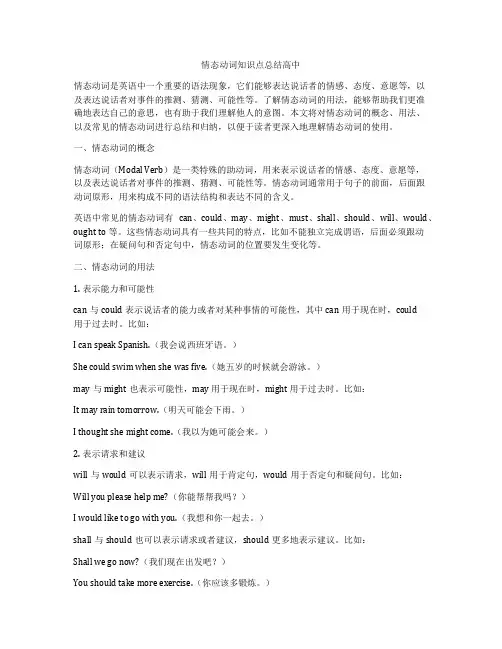
情态动词知识点总结高中情态动词是英语中一个重要的语法现象,它们能够表达说话者的情感、态度、意愿等,以及表达说话者对事件的推测、猜测、可能性等。
了解情态动词的用法,能够帮助我们更准确地表达自己的意思,也有助于我们理解他人的意图。
本文将对情态动词的概念、用法、以及常见的情态动词进行总结和归纳,以便于读者更深入地理解情态动词的使用。
一、情态动词的概念情态动词(Modal Verb)是一类特殊的助动词,用来表示说话者的情感、态度、意愿等,以及表达说话者对事件的推测、猜测、可能性等。
情态动词通常用于句子的前面,后面跟动词原形,用来构成不同的语法结构和表达不同的含义。
英语中常见的情态动词有can、could、may、might、must、shall、should、will、would、ought to等。
这些情态动词具有一些共同的特点,比如不能独立完成谓语,后面必须跟动词原形;在疑问句和否定句中,情态动词的位置要发生变化等。
二、情态动词的用法1. 表示能力和可能性can与could表示说话者的能力或者对某种事情的可能性,其中can用于现在时,could用于过去时。
比如:I can speak Spanish.(我会说西班牙语。
)She could swim when she was five.(她五岁的时候就会游泳。
)may与might也表示可能性,may 用于现在时,might 用于过去时。
比如:It may rain tomorrow.(明天可能会下雨。
)I thought she might come.(我以为她可能会来。
)2. 表示请求和建议will与would可以表示请求,will用于肯定句,would用于否定句和疑问句。
比如:Will you please help me?(你能帮帮我吗?)I would like to go with you.(我想和你一起去。
)shall与should也可以表示请求或者建议,should更多地表示建议。
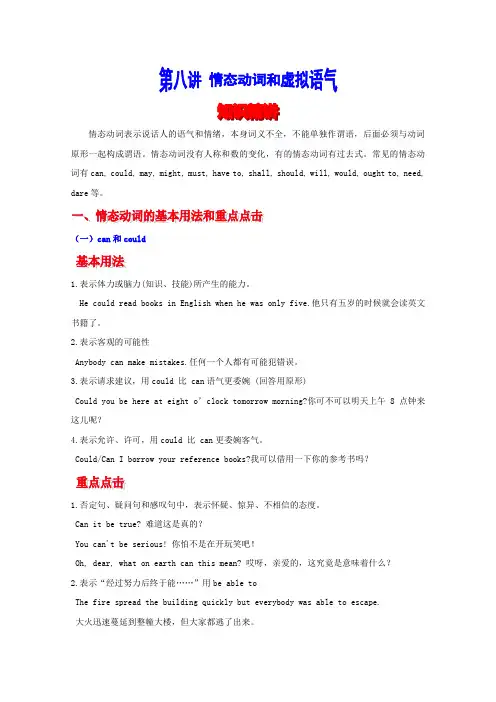
情态动词表示说话人的语气和情绪,本身词义不全,不能单独作谓语,后面必须与动词原形一起构成谓语。
情态动词没有人称和数的变化,有的情态动词有过去式。
常见的情态动词有can, could, may, might, must, have to, shall, should, will, would, ought to, need, dare等。
(一)can和could1.表示体力或脑力(知识、技能)所产生的能力。
He could read books in English when he was only five.他只有五岁的时候就会读英文书籍了。
2.表示客观的可能性Anybody can make mistakes.任何一个人都有可能犯错误。
3.表示请求建议,用could 比 can语气更委婉 (回答用原形)Could you be here at eight o’clock tomorrow morning?你可不可以明天上午8点钟来这儿呢?4.表示允许、许可,用could 比 can更委婉客气。
Could/Can I borrow your reference books?我可以借用一下你的参考书吗?1.否定句、疑问句和感叹句中,表示怀疑、惊异、不相信的态度。
Can it be true? 难道这是真的?You can't be serious! 你怕不是在开玩笑吧!Oh, dear, what on earth can this mean? 哎呀,亲爱的,这究竟是意味着什么?2.表示“经过努力后终于能……”用be able toThe fire spread the building quickly but everybody was able to escape.大火迅速蔓延到整幢大楼,但大家都逃了出来。
注意:be able to比can有更多的形式变化When he grows up, he will be able to support his family.他长大后就能养家了。
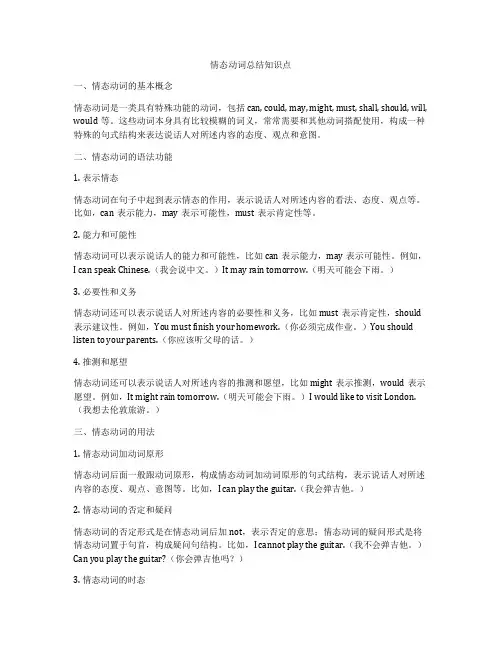
情态动词总结知识点一、情态动词的基本概念情态动词是一类具有特殊功能的动词,包括can, could, may, might, must, shall, should, will, would等。
这些动词本身具有比较模糊的词义,常常需要和其他动词搭配使用,构成一种特殊的句式结构来表达说话人对所述内容的态度、观点和意图。
二、情态动词的语法功能1. 表示情态情态动词在句子中起到表示情态的作用,表示说话人对所述内容的看法、态度、观点等。
比如,can表示能力,may表示可能性,must表示肯定性等。
2. 能力和可能性情态动词可以表示说话人的能力和可能性,比如can表示能力,may表示可能性。
例如,I can speak Chinese.(我会说中文。
)It may rain tomorrow.(明天可能会下雨。
)3. 必要性和义务情态动词还可以表示说话人对所述内容的必要性和义务,比如must表示肯定性,should 表示建议性。
例如,You must finish your homework.(你必须完成作业。
)You should listen to your parents.(你应该听父母的话。
)4. 推测和愿望情态动词还可以表示说话人对所述内容的推测和愿望,比如might表示推测,would表示愿望。
例如,It might rain tomorrow.(明天可能会下雨。
)I would like to visit London.(我想去伦敦旅游。
)三、情态动词的用法1. 情态动词加动词原形情态动词后面一般跟动词原形,构成情态动词加动词原形的句式结构,表示说话人对所述内容的态度、观点、意图等。
比如,I can play the guitar.(我会弹吉他。
)2. 情态动词的否定和疑问情态动词的否定形式是在情态动词后加not,表示否定的意思;情态动词的疑问形式是将情态动词置于句首,构成疑问句结构。
比如,I cannot play the guitar.(我不会弹吉他。
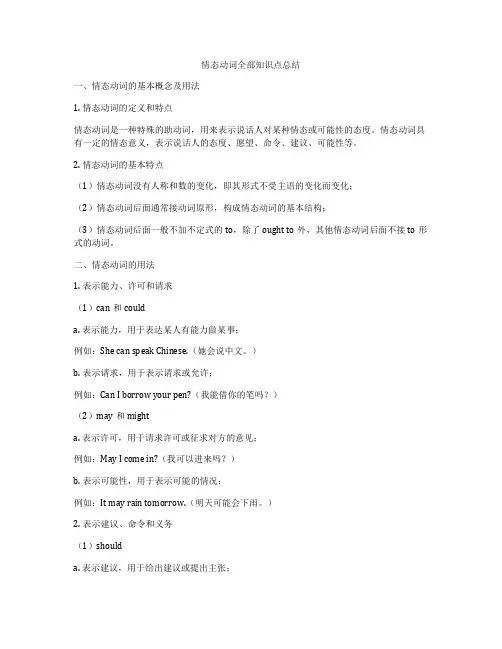
情态动词全部知识点总结一、情态动词的基本概念及用法1. 情态动词的定义和特点情态动词是一种特殊的助动词,用来表示说话人对某种情态或可能性的态度。
情态动词具有一定的情态意义,表示说话人的态度、愿望、命令、建议、可能性等。
2. 情态动词的基本特点(1)情态动词没有人称和数的变化,即其形式不受主语的变化而变化;(2)情态动词后面通常接动词原形,构成情态动词的基本结构;(3)情态动词后面一般不加不定式的to,除了ought to外,其他情态动词后面不接to形式的动词。
二、情态动词的用法1. 表示能力、许可和请求(1)can和coulda. 表示能力,用于表达某人有能力做某事;例如:She can speak Chinese.(她会说中文。
)b. 表示请求,用于表示请求或允许;例如:Can I borrow your pen?(我能借你的笔吗?)(2)may和mighta. 表示许可,用于请求许可或征求对方的意见;例如:May I come in?(我可以进来吗?)b. 表示可能性,用于表示可能的情况;例如:It may rain tomorrow.(明天可能会下雨。
)2. 表示建议、命令和义务(1)shoulda. 表示建议,用于给出建议或提出主张;例如:You should see a doctor.(你应该去看医生。
)b. 表示义务,用于表示责任或义务;例如:We should obey the law.(我们应该遵守法律。
)(2)ought toa. 表示责任或义务,用于表示应该做的事情;例如:You ought to apologize to her.(你应该向她道歉。
)3. 表示可能性和必然性(1)musta. 表示必然性,用于表示肯定的推断或必然的结论;例如:He must be at home now.(他现在一定在家。
)b. 表示义务,用于表示应遵守的规定或责任;例如:Students must wear school uniforms.(学生必须穿校服。
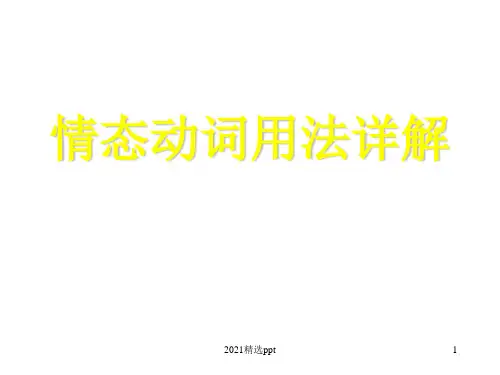
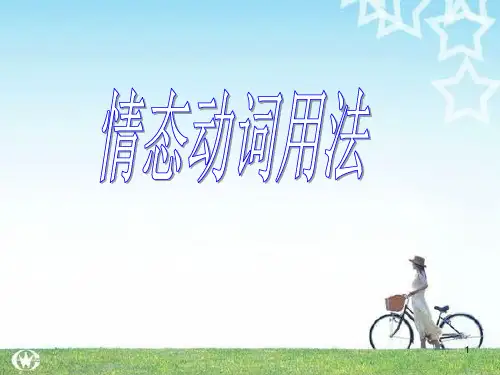
情态动词的知识点总结一、情态动词的定义和特点情态动词(Modal Verbs)是一类特殊的助动词,用来表示说话者对某种可能性、必然性、推测性、建议性、义务性等的看法或态度。
情态动词有其特殊的用法和含义,一般不作为定语或宾补,不定式,分词,动名词和被动语态等也不与情态动词连用。
情态动词没有人称和数的变化,而且在肯定句和一般疑问句中不需要使用助动词。
例如:1. He can speak English.(他会说英语。
)2. Can he speak English?(他会说英语吗?)二、情态动词的用法情态动词在句子中的主要用途包括:1. 表示能力或许可Can 和 could 表示一种能力或许可的可能性。
Can 表示一般的能力或许可,could 则表示过去的或某种虚拟的能力或许可。
例如:I can play the piano.(我会弹钢琴。
)You could go to the party last night.(你昨晚本来可以去参加聚会的。
)2. 表示推测或合理性may 和 might 表示推测或某种合理推测的可能性。
may 表示肯定推测,might 则表示可能性更小或更不肯定。
例如:She may be at home now.(她可能现在在家。
)He might be studying for the big exam.(他可能正在为那场重要的考试学习。
)3. 表示意愿、建议、请求和命令will 和 would 表示发出固有的意愿、建议或请求的情态意义。
will 用于一般现在时,would 用于一般过去时。
例如:I will help you with your homework.(我会帮助你做作业。
)He said he would call you back later.(他说他过会儿会给你回电话。
)4. 表示责任和义务must 表示一种肯定的表达责任或义务的态度。
例如:You must complete the task by tomorrow.(你必须在明天前完成任务。
第八讲动词和动词词组思维导图:动词考点:时态,语态,非谓语动词,主谓一致动词的分类: 实义动词、系动词、助动词、情态动词的用法动词的分类:实义动词、助动词、系动词、情态动词@动词的基本形式:动词原形、第三人称单数、过去式、过去分词、现在分词动词的用法:1. 实义动词的用法:及物动词带宾语,有被动语态不及物动词不带宾语,没有被动语态…1)及物动词及物动词可以有一个或两个(直接和间接)宾语,或者复合宾语(接一个宾语的同时再接一个补语)①常见的跟单宾语的及物动词Accept, borrow, bury, cover, defeat, discover, eat, excite, forget, guess, put, please, surprise, enjoy, worry等Do you intend to accept the gift②常见的跟双宾语的及物动词Bring, buy, feed, find, get, give, hand, lend, make, offer, pass, show, teach, tell 等。
一般间接宾语在前,直接宾语在后。
如果直接宾语在前,那么在间接宾语前加介词to或for《如:we showed the visitors our new products.=we showed our new product to the visitors.A.直接宾语位于间接宾语之前时,常用介词to作搭配的动词有:Accord, advance, award, bring, deal, forward, give, grant, hand, lease, leave,lend, loan, mail, offer, owe, pass, pay, play, post, read, rent, repay, sell. Send, serve, show, sing, take, teach, tell, write.B.直接宾语在前,常与介词for搭配的动词有book, buy, bring, build, cook,cash, cut, design, fetch, find, fix, get, guarantee, keep, leave, make, mix, order, paint, pick, play, pour, prepare, set, reserve, save, secure, sing, spare, take, win, write等C.有一些动词不能接to或for,只能放在直接宾语前Allow, ask, bet, cause, charge, cost, deny,draw, envy, forgive, promise, refuse 等She wished them a safe journey.她祝你们一路平安。
第八讲情态动词和虚拟语气(一)情态动词单句语法填空1.(2018·北京高考单选)In today’s information age, the loss of data can cause serious problems for a company.2.(2018·天津高考单选)I can’t find my purse. I could_have_left (leave) it in the supermarket yesterday, but I’m not sure.3.(2016·全国卷Ⅲ)Sometimes chopsticks are quite artistic. Truly elegant chopsticks might be_made (make) of gold and silver with Chinese characters.4.(2016·北京高考单选)I love the weekend, because I needn’t get up early on Saturdays and Sundays.5.(2016·天津高考单选)It was really annoying; I couldn’t get access to the data bank you had recommended.6.(2015·北京高考单选)—Can’t you stay a little longer?—It’s getting late.I really must go now. My daughter is home alone.7. (2015·福建高考单选)—Sorry, Mum! I failed the job interview again.—Oh, it’s too bad. You should_have_made (make) full preparations.8.(2015·陕西高考单选)You may feel all the training a waste of time, but I’m a hundred percent sure later you’ll be grateful you did it.一、情态动词的基本用法(一)can/could的用法1.表示能力,意为“能,会”。
高中英语:情态动词一、情态动词的概述情态动词表示说话人的语气和情态,如需要、可能、意愿和怀疑等,有一定的意义但是不完整,必须和动词原形一起构成谓语。
常见的情态动词有:can, could, may, might, must, ought to, need, dare, shall, will, should, would, be able to.二、情态动词的具体用法1. can (其过去式为could)1)表示能力,意为“能够” She can speak English.比较:be able to 强调设法做成了某事 =manage to doThe fire was very big, but most people were able to escape from it.表示将来的能力时,一般要用be able toThe baby will be able to walk in a few days.2)用于肯定句中,表示理论上的可能性。
Anyone can make mistakes.Don’t throw it away and it can be u seful in future.3)用于否定句、疑问句中表示推测、怀疑、惊讶等,表示对过去的推测时,用can/could have done的结构。
This can’t be done by him.Can it be true?How can you be so careless!4)表示请求或许可,此时could比can语气更加委婉。
----Could I come here again tomorrow?----Yes, you can. (回答时改用can)【练习】(1) A computer ______ think for itself; it must be told what to do.A. can’tB. couldn’tC. may notD. might not(2)The fire spread through the hotel very quickly but everyone ______ get out.A. had toB. wouldC. couldD. was able to(3) They will ______ run this machine on their own in three months.A. canB. couldC. mayD. be able to(4) That big cinema ______ seat 2,000 people.A. canB. shouldC. ought toD. is able to2.may & might1)表示可能性。
He said that he might not be free that afternoon.He may/might be ill today.2)表示许可,意为“可以”,此时在疑问句中might比may的语气更加委婉。
You may go now.May/Might I use your pen? (否定回答用mustn’t)3)may用于祈使句,构成“May+主语+动词原形”表示祝愿。
May you be happy.May you succeed.4)may/might as well + 动词原形意为“最好….,还是….好”We may as well stay here.5)may well do “大概会,可能会”You may well get confused.6)may/might have done 表示对过去所发生的事情的推测。
He may have said so.【练习】(1) — Could I borrow your dictionary?— Yes, of course you _______.A. mightB. willC. canD. should(2) — Might I watch TV after supper? — Yes, you ________.A. mayB. mustC. mightD. can3. must1)表示“必须”,强调主观看法(have to强调客观上必须)You must do everything as I do.表示“不必,没必要”时,用needn’t 或don’t have to.You needn’t go there at once.注意---Must we turn in our plan this week?---Yes, you must./No, you needn’t/don’t have to.2)(只用于肯定句中)表示肯定的推测。
对目前状况的推测用 must do 或 must bedoing,对过去的推测用 must have done.It must be raining outside.The light is on, so he must be at home.Look at his new car. He must have earned a lot of money.3)mustn’t 意为“禁止”Children must not play with fire.4)表示“偏要、非要、偏偏”Why must it rain on Sunday?Why must you do it?【练习】(1) You ______ return the book now. You can keep it till next week if you like.A. can’tB. mustn’tC. needn’tD. may not(2) Johnny, you ______ play with the knife, you ______ hurt yourself.A. won’t ; can’tB. mustn’t ; mayC. shouldn’t ; mustD. can’t ; shouldn’t(3) --Will you stay for lunch?--Sorry, _____. My brother is coming to see me.A. I mustn’tB. I can’tC. I needn’tD. I won’t(4) --May I pick a flower in the garden?-- ________.A. No, you needn’tB. Not, please.C. No, you mustn’tD. No, you won’t4. need “需要”1)need做名词时,构成There is no need (for sb) to do sth. 某人没有必要做某事。
There is no need for us to tell her the news.2)sb need to do sth 某人需要做某事sth need to be done = sth need doing 某事物需要被做(want, require)We need to buy some books.The flowers need to be watered.=The flowers need watering.注意对need问句的回答:--Need I finish the work today?--Yes, ________________.No, ________________. No, ________________. needn’t 对其它情态动词的回答:--Shall I tell John about it? --No, you __________.--Must we do it now? --No, you __________.5. dare “敢”1)用作情态动词时,没有人称和数的变化,其后跟动词原形。
2)用作实意动词时,有人称和数的变化,其后跟to do.【练习】一、判断正误How dare you say such a thing?How dare you to say such a thing?He daren’t to speak English before such a crowd, did he?He daren’t speak English before such a crowd, dare he?二、完成句子(1)She dare not go out alone.否定句:一般疑问句:过去时态的肯定句:过去时态的否定句:(2)She dares to go out alone.否定句:一般疑问句:过去时态的肯定句:过去时态的否定句:6. will1)表示意愿、意图和决心,意为“要、愿”(would是其过去式)Will we buy a car?I will do my best to help you.2)疑问句中,与第二人称连用,表示“邀请、请求”(此时would比will更加委婉)Will you please turn down the TV?3)表示对现在或将来的推测、估计,意为“可能,想必“This will be the book you are looking for.That will be an insect.4)表示经常性、习惯性、倾向性等,意为“经常,总是,大概,惯于”Oil will float on the water.The man is strange. He will sit there for hours without saying anything.5)用于祈使句的附加疑问句中Come here early tomorrow, will you?Don’t go now, will you?【拓展】Let us go out for a walk, will you? (动作不包括主语you)Let’s go out for a walk, shall we? (动作包括主语you)7. would1)表示推测,意为“大概,也许“,可指现在或过去That would be in the spring of 1997.2)表示过去的习惯,意为“过去常常做某事“The old man would sit near the fire for hours on winter evenings.3)其他固定句型would like sth/to do sthwould rather do sth “但愿,宁愿做某事“would rather that从句 (要使用虚拟语气,时态向后倒)【练习】汉译英(1)我宁愿在这儿再待一周。